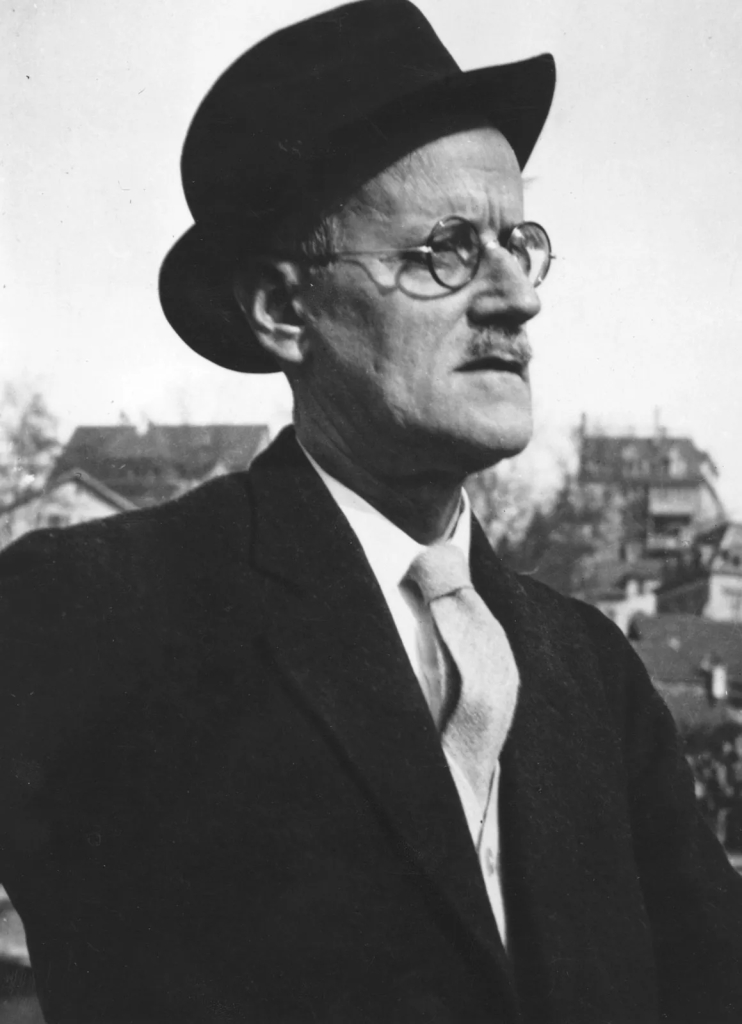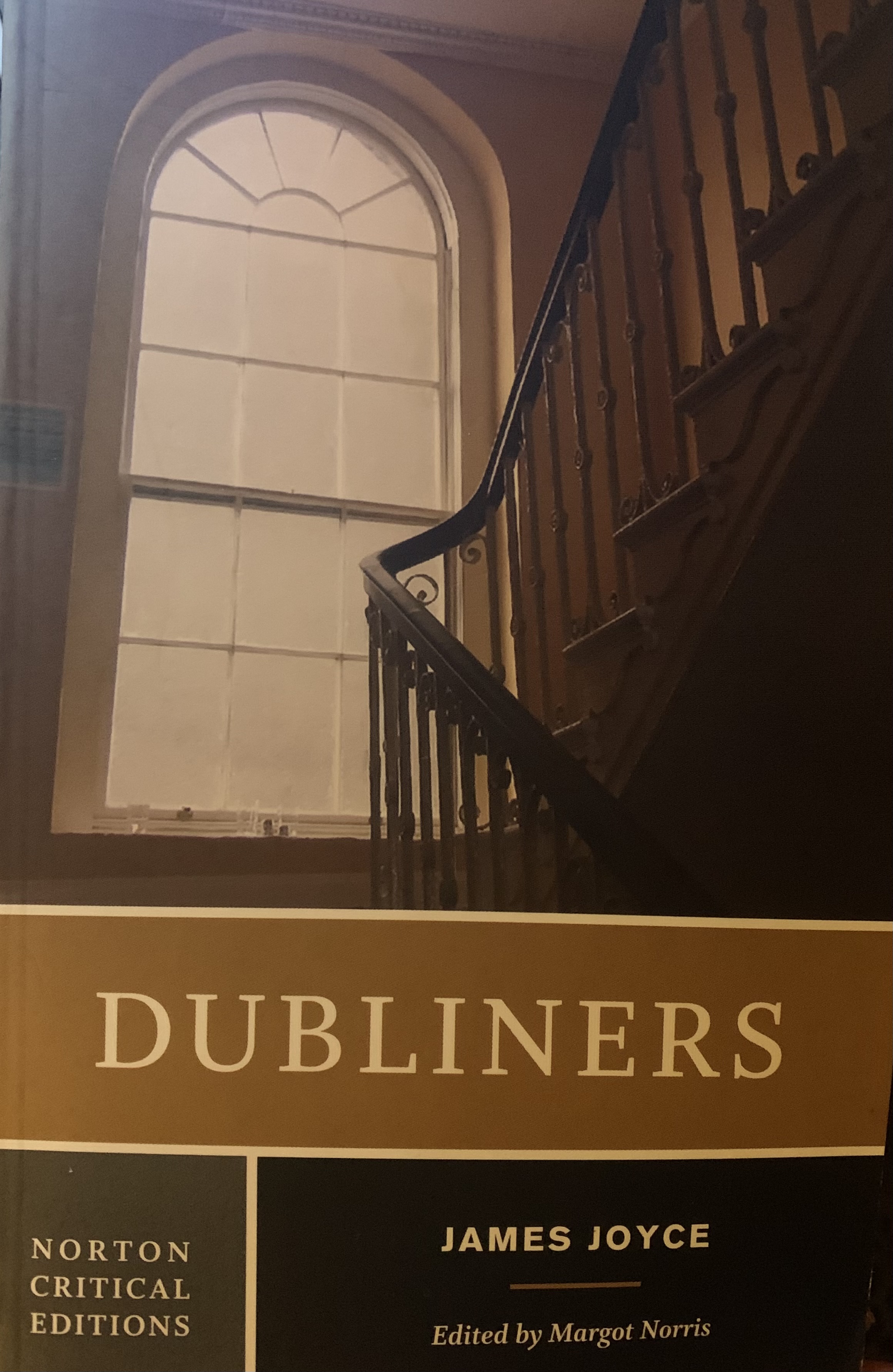James Joyce at Christmas, “The Dead” (1914)
Charles Dickens’ A Christmas Carol (1843) aside, James Joyce’s “The Dead” from 1914’s Dubliners may be the most famous work of classic fiction set entirely around Christmas. It is by no means as synonymous with the festive season as Dickens’ work, yet it could take place at no other time of year. Neither is its emotional trajectory as sharply drawn as Dickens’, yet there is a moment of moving and profound Christmas redemption at its denouement. Amid all the human complexity of the relationships surrounding Joyce’s protagonist Gabriel Conroy, there is a moment in which all finally falls away and leaves him with the purest vision of transience, mortality and human interconnectedness ever captured in literature.
The stage of the story is immediately set as a busy social gathering: “the Misses Morkan’s annual dance” is the name presently given to it. Repeated references to snow on the clothes and footwear of those entering establish the weather conditions and, a few pages in, Gabriel notes to the maid Lily that “it’s Christmas time, isn’t it?” as he tries to give her a tip. The narrator has by this stage given the location as Usher’s Island (which, as the name of the collection suggests, is in Dublin – as always with Joyce, it is a real geographical location), so we are given to know exactly when and where we are in an economical fashion.

Though the narration is third person, it is focalised through the thoughts of Gabriel. He is the only partygoer we are given internal access to. Notwithstanding the festive atmosphere, it is a time of anxiety for him. He is first discomposed by Lily’s refusal to take his tip and her “bitter and sudden” response to his light-hearted suggestion that she will be married soon. He worries about the upcoming speech he is expected to make.
More lingeringly, Miss Ivors’ comments that he is a “West Briton” derail his mood. It is a serious allegation. Ireland’s attempts to free itself from British rule mean anyone accused of being in sympathy with that rule is an outsider and a source of suspicion. Gabriel’s true but perhaps pedantic and injudicious comment that “Irish is not my language” annoys Miss Ivors. Further, he writes for a royalist-inclined newspaper and prefers to holiday on “the continent” than to go to the west of Ireland; therefore, he is not a nationalist like most of his compatriots. The idea of going west is to recur. The west of Ireland is the locus of true Irishness, far from Dublin which is the home of the alien government and ruling class. The west, while a harsh landscape productive of poverty, is the last bastion of Irish culture and the Irish language, a haven for patriots mythologised by, for example, Padraig Pearse and by Yeats (sometimes self-consciously, as in his poem “The Fisherman“).
Gabriel’s wife too is from the west, we soon discover. Greta is from Galway. When Gabriel tells her he had words with Miss Ivors about holidaying there, Greta insists she would love to go back but Gabriel remains uninterested. It is a short and seemingly minor exchange but Gabriel’s lack of sympathy with the idea of going west will come back to haunt him. 
The story is at its most Christmassy when the describing what is on the table, a feast of Dickensian proportions:
A fat brown goose lay at one end of the table and at the other end, on a bed of creased paper strewn with sprigs of parsley, lay a great ham, stripped of its outer skin and peppered over with crust crumbs, a neat paper frill round its shin and beside this was a round of spiced beef. Between these rival ends ran parallel lines of side-dishes: two little minsters of jelly, red and yellow; a shallow dish full of blocks of blancmange and red jam, a large green leaf-shaped dish with a stalk-shaped handle, on which lay bunches of purple raisins and peeled almonds, a companion dish on which lay a solid rectangle of Smyrna figs, a dish of custard topped with grated nutmeg, a small bowl full of chocolates and sweets wrapped in gold and silver papers and a glass vase in which stood some tall celery stalks. In the centre of the table there stood, as sentries to a fruit-stand which upheld a pyramid of oranges and American apples, two squat old-fashioned decanters of cut glass, one containing port and the other dark sherry. On the closed square piano a pudding in a huge yellow dish lay in waiting and behind it were three squads of bottles of stout and ale and minerals, drawn up according to the colours of their uniforms, the first two black, with brown and red labels, the third and smallest squad white, with transverse green sashes.
The sensual delights of the table, however, cannot long still the teeming thoughts of Gabriel’s mind. He sees his wife on the stairway as she listens to a cracked voice upstairs singing “The Lass of Aughrim”. There is much to unpack in the song choice. Aughrim is a village in the west (again), near Galway city, and was also the site of a famous battle in which the Irish forces were defeated by the British in the 17th century. Gabriel is struck by the “grace and mystery” of her attitude as she listens. There is something he is failing to understand, something in his wife’s relation to the west of Ireland that is a mystery to him. He can only listen and register the “old Irish tonality” of the song and the “grief” of the story it tells (about a young woman with a baby caught out in cold, wet weather and pleading with the man who has deserted her). This ushers in the final movement of the story, as Gabriel is awakened from his middle-class cosmopolitan stupor into an epiphany that is both universally humane and cosmically lonely.
As they leave the party for their hotel room, the snow is slushy and the light dull. Gabriel is filled alternately with joy and lust. Something in his wife’s reaction to the song has filled him with a desire for her he has not felt in a long time but when they reach their hotel room she falls to the bed in tears. She tells him the song reminds her of a boy she used to know in Galway who had sung it. His name was Michael Furey. It further transpired he died when, already ill, he snuck out to meet her on a wet night. Greta believes he died for love of her and Gabriel is stunned by this revelation from her past, so long hidden. In a moment of epiphany, Gabriel’s entire being seems to him shallow and insincere:
He saw himself as a ludicrous figure, acting as a pennyboy for his aunts, a nervous, well-meaning sentimentalist, orating to vulgarians and idealising his own clownish lusts, the pitiable fatuous fellow he had caught a glimpse of in the mirror. Instinctively he turned his back more to the light lest she might see the shame that burned upon his forehead.
In a stunning denouement, Gabriel’s evening in all its mundanity flashes before him and then he has a quasi-cosmic vision of the snow falling over the living and the dead of Ireland, from the Bog of Allen to the “lonely churchyard on the hill where Michael Furey lay buried.” Michael Furey is dead, but he once lived and loved more intensely than Gabriel ever has. The snow becomes a vague but powerful symbol of an all-encompassing force uniting the dead with the living (i.e. the not yet dead). There is no synopsis that could reproduce the epic sweep of this final movement wherein a small and inconsequential night in the life of a middle-class Dubliner ends by encapsulating life, death and the condition of all humanity. There are several moments in Joyce when he steps out from his wealth of local detail to an overview of man and woman’s place in the cosmos, but never so powerfully as this. As a Christmas story it is not as comforting as A Christmas Carol, but it is a similarly overwhelming example of an epiphany presented through literature.
“The Dead” can be an equally or even more powerful listening experience. This one by Barry McGovern is particularly good, and is also available wherever you get your podcasts. Happy Christmas to all and to all a good night!